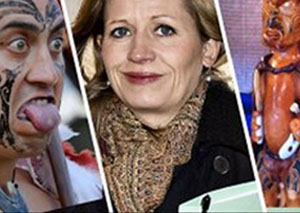
AUCKLAND (Pacific Media Watch): Several New Zealanders have sent hate mail to Danish politician Marie Krarup after she characterised a traditional Māori powhiri at Devonport Naval Base in unflattering terms.
And she has now apologised on a New Zealand television show after the controversy erupted yesterday.
In early March, Krarup, who is the defence spokesperson for the far-right Danish People’s Party, witnessed the Māori welcoming ceremony as one of six MPs from the Danish Committee on Defence.
After Krarup’s visit to the naval base, she wrote a commentary in the Danish newspaper BT where she made it clear that she did not appreciate the powhiri.
She called it a "shouting concert", and although Krarup did not call it uncivilised as reported in other media, she described the powhiri as "less civilised".
The Danish politician also criticised "big, erect penises" that she says decorated the "Māori temple" [marae].
Defence criticism
Krarup’s main point in her commentary was to link what she saw as an inability for New Zealand to defend itself militarily with multicultural developments in New Zealand the last few decades.
Krarup asked several questions in her commentary about New Zealand’s defence capabilities:
“Could one imagine that New Zealand is a kind of free-rider under an Australian defence umbrella? […] Or have they given up defending themselves? Or are there simply no threats to this distant island nation? I can hardly give the answer, but I did observe certain relinquishing traits.”
Krarup detailed her experiences at the Devonport Naval Base as an example of a relinquishing trait of New Zealand:
“One could perhaps call it [the marae] cultural annihilation or grotesque multi-cultural worship."
She characterised the naval officers as "beautiful, white-dressed and European looking", and expressed bewilderment regarding why New Zealanders of European ancestry had to perform a non-European custom to their European guests:
“It is a mystery to me that the naval officers could endure both the ceremony and the surroundings.”
Apology
Krarup apologised on TVNZ’s Breakfast show today and said the controversy was due to mistranslation from Danish to English. She did, however, reiterate that the powhiri was "grotesque". Furthermore, her blog entry has not been altered and includes all the original statements.
In a follow-up interview by BT, Krarup explained that:
“It sounds like I look down on the Māori. I do not do that, even though the culture is alien to me. I do wonder, though, why the Māori culture is forced upon New Zealanders of European ancestry. I am critical of a Western defence force incorporating other cultures in that way. It shows a colossal inclusiveness, but the question is if it is wise. It would be the same as if we here at home gave little girls scarves on their heads to appreciate Muslims.”
No homework
Krarup may not have been aware of what she was about to experience at Devonport Naval Base.
According to the New Zealand Herald, Krarup had been given briefing documents about the powhiri by the Danish ambassador to New Zealand, Børge Petersen, before it started. It is unclear, however, if she actually read them:
“She asked what the tradition was and we gave her a write-up, and also the navy had forwarded [to us] what it was all about so she had her background documents. She definitely had the opportunity to read up on that.”
Petersen emphasised that Krarup’s opinions did not reflect those of the Danish government.
The readers of the online newspaper Ekstrabladet seem to distance themselves from Krarup. In an online survey about 75 percent of the readers answered no to the question if it was “alright that Marie Krarup criticises the reception she received from the Māori in New Zealand”.
Against multiculturalism
The Danish People’s Party has since its establishment in 1995 worked against Denmark becoming a multi-ethnic society. In its party-programme the party states that:
“Denmark is not an immigrant country and never has been. Thus we will not accept transformation to a multi-ethnic society.”
The party received 12.3 percent of the votes in the last general election in 2011 and became the third largest party in the Danish Parliament. The party has never been part of any government coalition, but cooperated with the previous government.
The BT commentary can be found here (in Danish), and Marie Krarup’s personal blog can be found here (in Danish).
One of the Pacific Media Watch editors is proficient in Danish and has provided a translation of the entire blog entry:
Never can a people perish, who do not want it themselves
The nature of New Zealand is breathtaking and the population is friendly and civilised. Oh well... On an official trip with the Committee on Defence I had the pleasure of participating in visits to different defence installations in New Zealand.
And one has to say, that there was both civilisation and the opposite present. It sounds immediately odd for Danish politicians to travel to the other side of the globe to study defence. However, there are many evident similarities between New Zealand and Denmark.
The size of the population (4.4 million in NZ [as compared to 5.5 million in Denmark]), the desire to save expenditures on defence so that its proportion of the GDP is limited, as well as large tasks such as surveillance of Arctic areas.
New Zealand is cutting in its defence spending and is right now conducting an 18 percent reduction of its budget. One has therefore refrained from offensive capabilities – no fighter jets, no tanks and only two frigates. The Defence Force’s task is to a high degree civil, in that it is very much involved in helping out in humanitarian catastrophes, ocean rescues and control of its fishery.
New Zealand’s policies sound very much a dream for the Radical Left Party! [A Danish party, which traditionally has been antimilitaristic.] How can one have a defence without offensive capabilities? That was a natural question for us [the six Danish MPs from the Committee on Defence]. Because one can very well imagine situations where one will have to defend oneself from attacks.
Our fighter jets, for example, are a guarantee for us to uphold our sovereignty. A researcher at a New Zealand think tank answered very sensibly:
“It is not natural for New Zealand to spend money on something that will not be used. So we rather spend money on other things.”
The thought of [military] deterrent is apparently far from New Zealand!
During the visit we were repeatedly told that New Zealand trains and coordinates with Australia. And they have plenty of fighter jets! Could one imagine that New Zealand is a kind of free-rider under an Australian defence umbrella? A little bit like Denmark in NATO under the footnote politics? [A term for Danish defence politics between 1982 and 1988, where the Danish conservative cabinet against its will had to represent the Parliament’s wishes in NATO meetings of showing resistance against the arms race.]
Or have they given up defending themselves? Or are there simply no threats to this distant island nation? I can hardly give the answer, but I did observe certain relinquishing traits.
New Zealand was colonised by the British and has not always treated its original people – the Māori well. Today they comprise 12 percent of the population [14.6 percent is the correct figure according to the 2006 census], but receive great attention and have trumped through a politics of compensation where they can get reimbursements for the harm inflicted on them since the British-Māori deal was agreed in 1840 [Treaty of Waitangi].
On the cultural area they have a rising influence. Since 2000 there has been an increased focus on resurrecting their language and culture, not only among Māori, but in the entire population.
Here I arrive at the less civilised part of the Committee on Defence’s visit. When we arrived at the naval base we were not greeted with handshakes or salutes from uniformed men as usual. No, we were greeted by a Māori dance ritual, with a half-naked man in grass skirt who shouted and screamed in Māori.
He did some strange rituals and showed his tongue, while we observed and were instructed by a local that we should not laugh, and that we after his shouting concert would go in to the Māori temple [marae] where the naval officers awaited us.
However, they were still not allowed to shake our hands. Instead we had to go through a ritual in Māori, where the beautiful, European looking, white-dressed naval officers spoke in broken Māori and sang a song that sounded like “Mariehønen evigglad” [a Danish children's song that you can listen to here] in Māori - complete with guitar-accompaniment.
I tried to capture the eyes of the naval officers’ during the execution of the ritual, but they looked down at the ground!
After the ritual we were finally allowed to greet the naval officers – but with nose rubbing [hongi] – not with handshakes. I would like to say hello and tell that one feels like an idiot when one is forced to rub noses with ten European looking naval officers.
Great was my appreciation when one of the guys gave me a kiss on the cheek instead of a nose rub!
After the ritual we were able to speak English and commence a civilised visit. Although we did see the Māori temple, that was decorated with god-like creatures with angry faces and big erect penises.
It is a mystery to me that the naval officers could endure both the ceremony and the surroundings.
The temple is one of several, and there are planned even more to welcome official guests to defence installations in New Zealand. It is a part of a programme directed towards “cultural awareness”!
One could perhaps call it [marae] cultural annihilation or grotesque multicultural worship. It has, however, had its impact on the New Zealand naval officers!
Later on during our visit I was informed by a worried, conservative politician, that between 50.000 and 80.000 New Zealanders leave the country every year. But the population is not declining. The people departing – mostly of European ancestry – are replaced by Asian immigrants.
“It will not be long until we are a brown people”, as he said. Of course colour does not matter - but how will the culture be in future New Zealand? It will unlikely be as it has been the latest 200 years. At least it seems that New Zealand does not have the will to implement their own culture.
Valdemar Rørdam wrote famously that “a people will never perish, who do not want it themselves”. It does not seem like New Zealanders are a people that will survive. Neither their defence, nor their culture.
Never let Denmark become like this!

This work is licensed under a Creative Commons Attribution-NonCommercial 3.0 New Zealand Licence.




